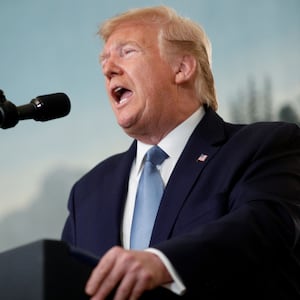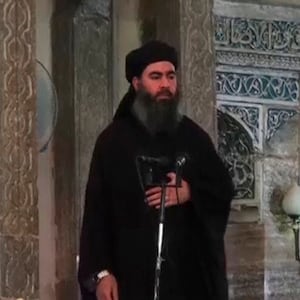Prologue: On Feb. 7, 2018, Kurdish-led troops backed by U.S. special operations forces, just a few dozen American soldiers, were protecting a Conoco natural gas facility in eastern Syria taken away from the so-called Islamic State some months before. Suddenly they saw hostile troops massing for a pitched battle. But they weren’t ISIS forces, they were soldiers from the Assad regime backed by Russian mercenaries. As fighting began, Syrian tanks and artillery closed in on the Kurdish and American positions, and the Americans summoned devastating airpower. Then-Defense Secretary Jim Mattis called for the attacking force to be annihilated, as he later told the Senate, “and it was.” In the end, as many as 300 of the attackers were killed. In any case, they retreated, never to return.
But that was then. Today, the apparent logic of Trump administration policy is to find a way to make the Syrians and Russians pay for those oil and gas fields, not with blood, but with money.
***
Long ago, when Donald Trump was known widely as a failing casino owner and budding reality TV star, he had what he thought was a brilliant idea. If the United States was going to send troops into Iraq to overthrow a tyrant like Saddam Hussein, it should at least make a profit. And in his rambling press conference on Sunday after the momentous announcement that the founder of the so-called Islamic State had been killed, now-President Trump waxed positively wistful on the subject of oil.
“If you read about the history of Donald Trump, I was a civilian. I had absolutely nothing to do with going into Iraq and I was totally against it,” he reminisced. “But I always used to say if they're going to go in—nobody cared that much but it got written about—if they're going to go in —I'm sure you've heard the statement because I made it more than any human being alive. If they're going into Iraq, keep the oil. They never did. They never did.”
Anyone who listened to Trump on Sunday could not miss his thinking or his intent even as the same U.S. forces he ordered pulled out of Syria earlier this month were sent back in to maintain control over several oil and gas fields. The Middle East may be full of “blood-stained sand” as Trump said last week. But that’s oil-soaked sand as well. Trump is thinking, and saying, he can make a buck—or anyway his MAGA government can make a buck—by holding on to those fields.
For any government concerned with the rule of law, this sort of action would be, well, unthinkable. Retired Gen. Barry McCaffrey exploded on Twitter: “WHAT ARE WE BECOMING.... PIRATES? If ISIS is defeated we lack Congressional authority to stay. The oil belongs to Syria.”
Mary Ellen O’Connell, an international-law professor at the University of Notre Dame and formerly a legal adviser to oil firms, said the U.S. garrisoning around the northeastern Syrian oil fields “is the culmination of a lawless policy, containing an open door to unrestricted violence in international affairs.”
In the day or so since Trump spoke, his secretary of defense, Mark Esper, and his chairman of the joint chiefs of staff, Gen. Mark Milley, among others, have tried to focus on some of the ancillary reasons Trump had suggested for holding the fields—ones that may still be illegal but don't sound so crass and so blatantly transactional:
First, to keep ISIS from re-taking the facilities it held from 2014 to 2017 and used to fund its vast operations. (Astute observers may wonder why, if ISIS was defeated as thoroughly as Trump has claimed for months, there would be such concern now about it marshaling the forces to take and hold oil and gas fields.)
Second, the oil-protection policy is meant to help the Kurdish-led Syrian Democratic Forces. Trump betrayed them earlier this month in an ill-considered phone call when he gave a de facto green light for Turkish President Recep Tayyip Erdogan to invade and ethnically cleanse predominantly Kurdish areas of Syria near the Turkish border. That provoked the on-again-off-again troop withdrawals and wild efforts by Trump to extract a ‘win’ from the chaotic situation he precipitated. According to Esper, the Kurds can use money from the oil and gas fields to “to secure ISIS prison camps and conduct operations against ISIS among other things.”
But that’s not really where Trump’s head was at when he spoke Sunday. He was thinking “let’s make a deal,” and said so.
Again, it’s best to let him talk for himself: “The oil is, you know, so valuable, for many reasons,” Trump told reporters. “It fueled ISIS, number one. Number two, it helps the Kurds, because it's basically been taken away from the Kurds. They were able to live with that oil. And number three, it can help us, because we should be able to take some also. And what I intend to do, perhaps, is make a deal with an ExxonMobil or one of our great companies to go in there and do it properly. Right now it’s not big. It's big oil underground but it’s not big oil up top. Much of the machinery has been shot and dead. It's been through wars. But—and—and spread out the wealth. But no, we’re protecting the oil, we're securing the oil. Now that doesn’t mean we don't make a deal at some point.”
Professor O’Connell says there is no legal basis for the U.S. to extract or sell the oil without explicit consent from the Assad government: “It could only happen with formal consent, an arrangement” from Assad. From the start of U.S. military operations in Syria 2014, their presence has been legally dubious. For them to continue operating would likely require a formal basing agreement, and that’s not going to happen.
“If I were advising Exxon, I’d say do not go near this conflicted and violent zone,” said O’Connell. She warned that contracts for Syrian oil signed by American companies might “undermine your own company’s reputation.”
So, as U.S. troops and their rueful Kurdish allies camp out in the desert far from the Kurds' invaded homeland, the U.S. has brought in what Defense Secretary Esper calls "mechanized units." Most likely these are lightly armored but fast-moving MRAPs and Stryker armored fighting vehicles backed up by American air power.
Among the military, memories of the fight against the Russians and the Assad regime in February last year are fresh enough to want to avoid a repetition. If the Russians and the regime want the oil and gas fields, they are going to have to pay for them one way or another.
But at the end of the day, unless Trump means to colonize eastern Syria, which would mean he'd never be bringing our brave soldiers home, the U.S. is going to have to unload the oil fields, and the only viable customers are going to be Bashar al-Assad and the Russians.
Indeed, as long as the fields are protected, that serves the interests of Damascus and Moscow.
"From the Syrian regime point of view, if you are Assad, the sovereign owner of those fields, you would rather see them destroyed than used by somebody else, because the oil that stays in the ground belongs to you," says a source on Middle East energy security speaking on background. "Assuming we actually maintain control and keep anybody from stealing, we are actually doing the job for him." The Kurds' ability to exploit the battered fields is at best minimal. "Ultimate control is likely to pass to the Russians," says this source.
Meanwhile, a knowledgeable U.S. official tells The Daily Beast that all U.S. activity near the oil fields will be “deconflicted” with the Assad government, not in direct communications, but using the Russians as intermediaries.
It escaped nobody's notice that when Trump spoke on Sunday, he went out of his way to thank the Russians for their cooperation in the killing of ISIS leader Abu Bakr al-Baghdadi the previous night, apparently because they didn't shoot down the U.S. helicopters over territory they control.
"There was a chance that we would have met unbelievable fire. Russia treated us great," Trump said. "They opened up. We had to fly over certain Russia areas, Russia-held areas. Russia was great."
Later in the press conference, Trump said he had given the Russians a little tease about what the super secret U.S. Special Operations Forces were up to, albeit without mentioning Baghdadi specifically: "We did tell them, we think you’re going to be very happy because, you know, again, they hate ISIS as much as we do."
Probably the Russians figured the mission out from Trump's hints. But Trump's notion that they are committed to fighting ISIS was not evident last year, certainly, as Russia's private military contractors, supposedly fighting the Islamic State, instead led the attack on Kurdish and American troops at the Conoco oil field.
When Esper and Gen. Milley talked to reporters on Monday, CNN’s Barbara Starr asked them directly if part of the mission of the troops now being deployed around the Conoco oil and gas fields was to protect them from Russian and Syrian forces. Both the secretary and the general tried to avoid answering that question at all, but finally Esper said, “The short answer is yes.” But the rationale, he said, repeating his talking points, is to protect the Kurds’ source of income to keep ISIS prison camps running.
At least until a better deal comes along.
— Spencer Ackerman and Erin Banco contributed reporting to this story







